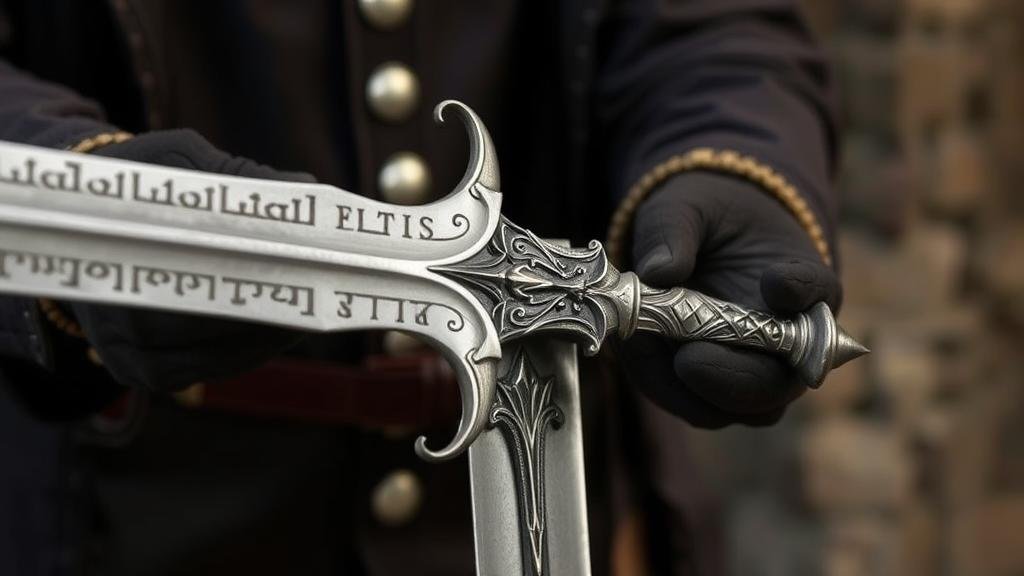Searching for the real history behind the mythical sword Excalibur and its possible origins.
Searching for the Real History Behind the Mythical Sword Excalibur
Excalibur is perhaps one of the most famous swords in literature and myth, famously associated with King Arthur and the legend of Camelot. The allure of this mythical weapon extends beyond its fantastical tales; many enthusiasts and scholars have sought to uncover its true origins and the historical contexts from which it emerged. This article examines the various facets of Excalibur, from its legendary status to possible real-world counterparts.
The Legendary Context of Excalibur
The story of Excalibur is deeply intertwined with Arthurian legend, a rich tapestry of tales that emerged during the Middle Ages. sword is said to have been given to King Arthur by the Lady of the Lake, emphasizing its magical qualities. In the earliest reference to the sword, Geoffrey of Monmouths Historia Regum Britanniae, written around 1136, the tale of Arthur begins to take shape. Geoffrey portrays Arthur as a noble ruler that defended Britain against Saxon invaders, establishing the foundations of British folklore.
Historical Texts and Depictions
Also to Geoffrey’s writings, Excalibur appears prominently in various texts, most notably in Sir Thomas Malorys Le Morte dArthur, published in 1485. Malory presents Excalibur as not only a symbol of Arthurs kingship but also as a vessel for his destiny. The imagery of Excalibur has also inspired countless artists and writers across centuries, from Tennyson to modern films.
The Origins of Excalibur: Myth vs. Reality
Several theories attempt to pin down the possible historical origins of Excalibur. One of the prominent hypotheses links it to actual historical swords, such as:
- La Tène Swords: Archaeological findings from the La Tène period (around 450-1 BC) in Europe showcase intricately designed swords that evoke similar imagery to that of Excalibur.
- The Sword in the Stone: The concept of a sword embedded in a stone, which Arthur pulls out in some versions of the legend, echoes real-life practices of ordination and claiming kingship, often represented by ceremonial swords.
Geographic and Cultural Considerations
The search for Excaliburs origins also leads to an examination of various geographic and cultural influences. The legends surrounding swords, magic, and kingship are prominent across several cultures:
- Celtic Influence: The Celts have a rich tradition of epic tales, including swords that confer divine right and protection.
- Roman Influence: The Romans wrote extensively about British tribes, blending local mythology with their own narratives, which may have influenced the shaping of Arthurian legends.
Possible Real-World Counterparts
In reviewing the historical background, several swords from history could be viewed as inspiration for Excalibur:
- Durendal: The legendary sword of Roland, mentioned in The Song of Roland, shares similarities in its mythical portrayal as an unbeatable weapon.
- Claiomh Solas: In Irish mythology, this sword is often associated with the hero Cú Chulainn, known for its magical properties and ability to shine brightly.
Modern Interpretations and Popular Culture
The legend of Excalibur continues to thrive in modern culture. Films like Excalibur (1981) and series such as Merlin have helped sustain interest in Arthurian lore. Also, video games like Dark Souls and The Legend of Zelda have incorporated elements of the Excalibur legend, ensuring its relevance across various media.
Conclusion: The Lasting Legacy of Excalibur
While the exact historical origins of Excalibur remain cloaked in legend and myth, the swords significance transcends time periods and cultures. It represents themes of nobility, courage, and the burdens of leadership. For those intrigued by the interplay of history and mythology, Excalibur serves as an entrance into a world where reality and fantasy merge. Ultimately, Excalibur teaches us about the power of stories–a reminder that while history can often be obscured, its echoes reverberate throughout time, inspiring generations.
Actionable Takeaways:
- Explore the broader context of Arthurian legends through literature and film.
- Investigate historical artifacts from the La Tène period for insight into ancient weaponry.
- Engage with modern interpretations of Excalibur in video games and literature to appreciate its evolving legacy.



